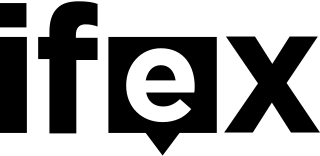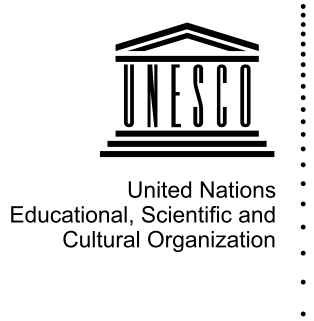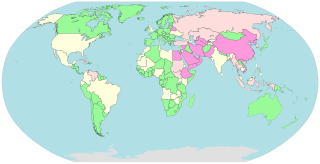
Freedom of the press or freedom of the media is the fundamental principle that communication and expression through various media, including printed and electronic media, especially published materials, should be considered a right to be exercised freely. Such freedom implies the absence of interference from an overreaching state; its preservation may be sought through constitution or other legal protection and security.
Artistic freedom can be defined as "the freedom to imagine, create and distribute diverse cultural expressions free of governmental censorship, political interference or the pressures of non-state actors." Generally, artistic freedom describes the extent of independence artists obtain to create art freely. Moreover, artistic freedom concerns "the rights of citizens to access artistic expressions and take part in cultural life - and thus [represents] one of the key issues for democracy." The extent of freedom indispensable to create art freely differs regarding the existence or nonexistence of national instruments established to protect, to promote, to control or to censor artists and their creative expressions. This is why universal, regional and national legal provisions have been installed to guarantee the right to freedom of expression in general and of artistic expression in particular. In 2013, Ms Farida Shaheed, United Nations special rapporteur to the Human Rights Council, presented her "Report in the field of cultural rights: The right to freedom of expression and creativity" providing a comprehensive study of the status quo of, and specifically the limitations and challenges to, artistic freedom worldwide. In this study, artistic freedom "was put forward as a basic human right that went beyond the 'right to create' or the 'right to participate in cultural life'." It stresses the range of fundamental freedoms indispensable for artistic expression and creativity, e.g. the freedoms of movement and association. "The State of Artistic Freedom" is an integral report published by arts censorship monitor Freemuse on an annual basis.

IFEX, formerly International Freedom of Expression Exchange, is a global network of more than 123 independent non-governmental organisations that work at a local, national, regional, or international level to defend and promote freedom of expression as a human right.

Freedom of information is freedom of a person or people to publish and consume information. Access to information is the ability for an individual to seek, receive and impart information effectively. This sometimes includes "scientific, indigenous, and traditional knowledge; freedom of information, building of open knowledge resources, including open Internet and open standards, and open access and availability of data; preservation of digital heritage; respect for cultural and linguistic diversity, such as fostering access to local content in accessible languages; quality education for all, including lifelong and e-learning; diffusion of new media and information literacy and skills, and social inclusion online, including addressing inequalities based on skills, education, gender, age, race, ethnicity, and accessibility by those with disabilities; and the development of connectivity and affordable ICTs, including mobile, the Internet, and broadband infrastructures".
The Tunisia Monitoring Group (IFEX-TMG) is a coalition of 21 free-expression organisations that belong to the International Freedom of Expression Exchange (IFEX), a global network of non-governmental organisations that promotes and defends the right to freedom of expression and freedom of the press.

The Belarusian Association of Journalists (BAJ) is a Belarusian professional association of journalists from independent media, created in 1995 to protect freedom of speech, freedom of information, promote the professional standards of journalism, conduct monitoring of Belarusian press, and offer legal support to all media workers.
The Pakistan Press Foundation (PPF) was established in 1967 as a non-profit organisation by the news agency Pakistan Press International and operated until 1974, when it had to suspend operations due to the political environment then prevailing in the country. It was reactivated in 1992 and has since been involved in assisting in the development of independent media in Pakistan by conducting training programmes for journalists, carrying out projects in research and documentation, and campaigning to defend and promote freedom of the press.
Source protection, sometimes also referred to as source confidentiality or in the U.S. as the reporter's privilege, is a right accorded to journalists under the laws of many countries, as well as under international law. It prohibits authorities, including the courts, from compelling a journalist to reveal the identity of an anonymous source for a story. The right is based on a recognition that without a strong guarantee of anonymity, many would be deterred from coming forward and sharing information of public interests with journalists.

The International Programme for the Development of Communication is a United Nations Educational, Scientific and Cultural Organization (UNESCO) programme aimed at strengthening the development of mass media in developing countries.

Censorship in Turkey is regulated by domestic and international legislation, the latter taking precedence over domestic law, according to Article 90 of the Constitution of Turkey.
Censorship in Japan has taken many forms throughout the history of the country. While Article 21 of the Constitution of Japan guarantees freedom of expression and prohibits formal censorship, effective censorship of obscene content does exist and is justified by the Article 175 of the Criminal Code of Japan. Historically, the law has been interpreted in different ways—recently it has been interpreted to mean that all pornography must be at least partly censored, and a few arrests has been made based on this law.
Freedom of speech is the concept of the inherent human right to voice one's opinion publicly without fear of government censorship or punishment. "Speech" is not limited to public speaking and is generally taken to include other forms of expression. The right is preserved in the United Nations Universal Declaration of Human Rights and is granted formal recognition by the laws of most nations. Nonetheless, the degree to which the right is upheld in practice varies greatly from one nation to another. In many nations, particularly those with authoritarian forms of government, overt government censorship is enforced. Censorship has also been claimed to occur in other forms and there are different approaches to issues such as hate speech, obscenity, and defamation laws.

Freedom of speech is a principle that supports the freedom of an individual or a community to articulate their opinions and ideas without fear of retaliation, censorship, or legal sanction. The right to freedom of expression has been recognised as a human right in the Universal Declaration of Human Rights and international human rights law by the United Nations. Many countries have constitutional law that protects free speech. Terms like free speech, freedom of speech, and freedom of expression are used interchangeably in political discourse. However, in a legal sense, the freedom of expression includes any activity of seeking, receiving, and imparting information or ideas, regardless of the medium used.
The United Nations Educational, Scientific and Cultural Organization is a specialised agency of the United Nations (UN) aimed at promoting world peace and security through international cooperation in education, arts, sciences and culture. It has 193 member states and 11 associate members, as well as partners in the non-governmental, intergovernmental and private sector. Headquartered at the World Heritage Centre in Paris, France, UNESCO has 53 regional field offices and 199 national commissions that facilitate its global mandate.

Ukraine was in 96th place out of 180 countries listed in the 2020 World Press Freedom Index, having returned to top 100 of this list for the first time since 2009, but dropped down one spot to 97th place in 2021.
This list of Internet censorship and surveillance by country provides information on the types and levels of Internet censorship and surveillance that is occurring in countries around the world.

David Kaye was the United Nations special rapporteur on the Promotion and Protection of the Right to Freedom of Opinion and Expression between August 2014 and July 2020. He is clinical professor of law at the University of California, Irvine on public international law, international humanitarian law human rights and international criminal justice. He was succeeded by Irene Khan in July 2020.

Media freedom in the European Union is a fundamental right that applies to all member states of the European Union and its citizens, as defined in the EU Charter of Fundamental Rights as well as the European Convention on Human Rights. Within the EU enlargement process, guaranteeing media freedom is named a "key indicator of a country's readiness to become part of the EU".

Safety of journalists is the ability for journalists and media professionals to receive, produce and share information without facing physical or moral threats.

This list of Internet censorship and surveillance in Africa provides information on the types and levels of Internet censorship and surveillance that is occurring in countries in Africa.










